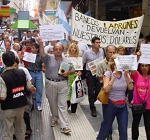‘Argentina has defaulted’, screamed the headlines in financial newspapers on July 31 this year. But it was not an accurate report. Argentina did not default. It was forced into default by a New York southern district court judge Thomas Griesa.
The Argentine government had deposited the payment of $539 million on June 26 – ahead of the due date – at a bank in New York to be transferred to the 92.4% bond holders. But Judge Griesa had blocked the transfer until Argentina paid the $1.3 billion plus interest, and also demanded by the vulture funds that hold just 1.6% of the bonds. Joseph Stiglitz, the Nobel Laureate, and Martin Guzman from Columbia University termed the artificial default “Griesafault “.
The Argentines are outraged, and are blaming the “Washington Consensus” for having caused the socio-economic problems of Argentina, not just now but since the 80s and 90s (which eventually lead to Argentina’s first default in this century in December 2001). Many say the support of Washington DC to the Argentine military dictatorship (whose crimes include incurring unnecessary and irresponsible external debt) was at the root of the country’s chronic problem of default. Now they accuse the New York judge of the same.
Facts of the case
After the December 2001 default on its debt of $81.8 billion, the Argentine government restructured the debt through agreements in 2005 and 2010 with 92.4% of the bond holders who have been receiving their interest payments punctually and seen the value of their bonds rise. The remaining 7% of the bond (value $4 billion) holders did not agree to the debt swap. Among these holdouts, the vulture funds hold 1.6% of the bonds worth $1.3 billion. NML Capital Ltd, the lead vulture fund sued the Argentine government demanding full payment. Judge Griesa ruled in their favour in November 2012. The Argentine appeal in a higher court was rejected and later the U.S. Supreme Court refused even to hear the appeal of the South American country. Judge Griesa then forced the Argentine government to negotiate with the vulture funds under Daniel Pollack, a New York-based lawyer appointed by him as mediator. The negotiations failed since the Argentine government didn’t agree to the outlandish demand of the vulture funds and the latter rejected the Argentine offer of payment on the same terms as paid to 92.4% of the bond holders. The deadline of 30 July passed without the payment, resulting in a default situation, although the Argentina has the money and willingness to pay.
Argentina has now taken the matter to the International Court of Justice, complaining that the decision of the U.S. judiciary is arbitrary, abusive, and beyond its jurisdiction besides ignoring the sovereign immunity of Argentina and hindering the sovereign debt restructuring process. But this would not help if the U.S. does not consent to the jurisdiction of ICJ on this matter.
American verdict
The American court verdict against Argentina contradicts the domestic law of the U.S. that allow individuals and companies as well as cities and counties to declare bankruptcy under Chapter 11 and 9 to ensure orderly survival when debts cannot be repaid in full. According to Stiglitz and Guzman “Griesa’s ruling encourages usurious behavior, threatens the functioning of international financial markets, and defies a basic tenet of modern capitalism: insolvent debtors need a fresh start. The U.S. financial system, already practiced at exploiting poor Americans, has extended its efforts globally.”
Judge Griesa’s decision has provided a potentially dangerous precedent for future debt restructuring of other countries. In a letter addressed to the U.S. Congress on 31 July, over 100 economists have expressed concern that the court judgment against Argentina could cause unnecessary damage to the international financial system. The letter has called for a legislative solution pointing out the examples of the UK and Belgium which have passed legislations preventing such litigations by holdouts.
Back to Washington DC
Washington has a chance to redeem itself – and protect its systems and global trust. Commentators like Greg Palast, say that an intervention by President Obama in the Argentine case can help in the same way as President Bush prevented the seizure of the U.S. property of Democratic Republic of Congo – also by NML.
But a long term solution lies with the U.S. Congress which can enact legislation, as the UK and Belgium have done, to prevent the predatory and unethical litigations by vulture funds in matters of foreign sovereign debt. This will go some way in alleviating the lengthening list of the sins of the ‘Washington Consensus’.
The long form of this article is available here.
Ambassador Viswanathan is Distinguished Fellow, Latin America Studies, Gateway House. He is the former Indian Ambassador to Argentina, Uruguay, Paraguay and Venezuela, and Consul General in Sao Paulo.
This article was exclusively written for Gateway House: Indian Council on Global Relations. You can read more exclusive content here.
For interview requests with the author, or for permission to republish, please contact outreach@gatewayhouse.in.
© Copyright 2014 Gateway House: Indian Council on Global Relations. All rights reserved. Any unauthorized copying or reproduction is strictly prohibited


